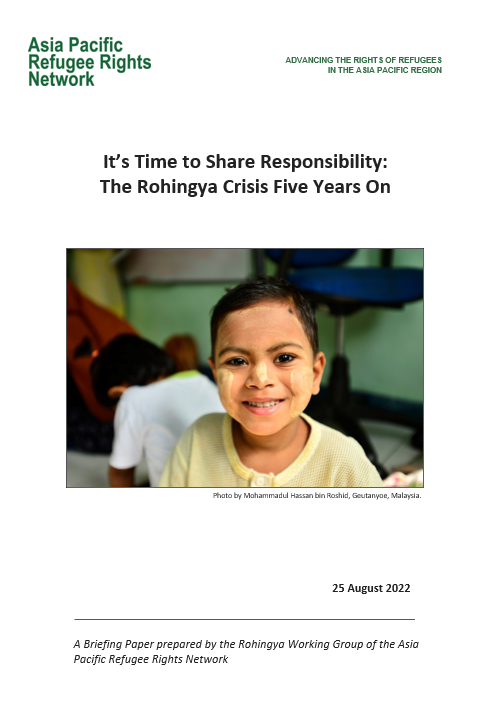The Rohingya Crisis Five Years On

 Call for Shared Responsibility to address the Rohingya Crisis Five Years On
Call for Shared Responsibility to address the Rohingya Crisis Five Years On
Released on 25 August 2022, the Asia Pacific Refugee Rights Network’s Briefing Paper outlines how all stakeholders can own their share of responsibility towards putting an end to the systematic marginalisation of Rohingya women, men and children, five years after more than 742,000 were driven out of Myanmar by brutal attacks in 2017.
“After more than 40 years of persecution, with no solutions in sight, and no clear political leadership, we are all complicit in the ongoing marginalisation of the Rohingya, and we must all begin to accept, and share responsibility if we hope that situation to change,” Hafsar Tameesuddin, Chair of APRRN and a former Rohingya refugee.
Co-written by APRRN’s Rohingya Working Group, the paper provides an in-depth analysis of countries of exile where Rohingya have sought refuge, including Bangladesh, Malaysia, India, Thailand, and Indonesia. It highlights the glaring lack of basic human rights and legal protections, the continuous cycle of forced displacement, and the normalisation of Rohingya marginalisation across the region, to outline concrete steps towards improvement.
OUR RECOMMENDATIONS AND MESSAGES
1. Responsibility-sharing: Begin diplomacy and negotiations towards adoption of more far reaching and long-term responsibility-sharing arrangements among the international community. Promote responsibility-sharing among each and every State for the Rohingya within their jurisdiction, and for those outside of their jurisdiction with unresolved legal status living both as stateless and as refugees in protracted displacement. The most likely solution is a multilateral one with a shared commitment from many stakeholders (not only Myanmar, not only regional governments, and not only States), one where everyone shares responsibility.
2. Promote and pursue ALL traditional durable solutions: permit no durable solution to be taken off of the table: voluntary return and repatriation in safety and dignity, local integration, and resettlement. This means promoting and advocating for root causes in Myanmar (continue to pursue justice and accountability for past and ongoing atrocities, and support progress towards a more peaceful, stable, and inclusive Myanmar that respects and protects human rights); seeking to catalyse a stronger call for protection and local integration everywhere that the Rohingya in fact find themselves; and stepping up resettlement, opening up pathways for large, not small, numbers of Rohingya to resettle permanently. Durable solutions are also needed for the voluntary return of IDPs confined to IDP camps in Rakhine, and this should be a precondition before any repatriation from Bangladesh takes place.
3. Strengthen national protection frameworks, including legal frameworks: develop a stronger regional protection framework in ASEAN in particular, and support the development of harmonised and sustainable state systems among Asian States more generally that prioritise protection over immigration enforcement.
4. End boat push-back practices, discuss and develop protection-based disembarkation protocols: provide immediate assistance to persons rescued at sea including addressing medical needs and preventing harm; guarantee access to a place of safety where risks are mitigated, needs are met, and legal status can be determined; respect customary laws and practices and respect the humanitarian imperative among non-governmental actors.
5. Reject the normalisation of Rohingya vilification and marginalisation: the deteriorating protection environment must be recognized and reversed. The fact of Rohingya vilification, marginalisation, and abuse in nearly every jurisdiction in which they are located is unacceptable. States and other actors must speak out against xenophobia, and take a proactive approach to welcome the Rohingya into communities and include them in all decision-making bodies, coordination mechanisms, and service provision schemes that affect the Rohingya.
6. Keep the Rohingya on the agenda: the loss of attention due to new crises and the protracted situation may result in fatigue, and reduction in resources which were never satisfactory to begin with. Deterioration of the protection environment is inevitable if we accept this deprioritisation.
7. Improve existing conditions for Rohingya refugees: In Bangladesh, recognize and address the deteriorating protection environment in refugee camps and on Bashan Char; in India, address the rampant xenophobia targeting the Rohingya and end the unlawful directive to detain and deport Rohingya refugees; in Thailand and Malaysia, end prolonged detention; in Indonesia, ensure adequate implementation of the 2016 Presidential Decree including disembarkation protocols and registration and protection for those disembarked; and in every context ensure access to education for all children, and access to employment so that no Rohingya refugee is forced to endure destitution or exploitation.
8. Embrace a “whole-of-society” approach: The needs of stateless Rohingya refugees are not being met. They are marginalised and at risk and generally find themselves in particularly vulnerable circumstances everywhere. It is unrealistic for any single actor to deliver protection alone, even if they are a State or an international institution like UNHCR. Instead, what must happen in practice is that a large number of stakeholders must collaborate through referrals networks: identifying needs, vulnerabilities and risks and making referrals to each other on the basis of capacities to address those needs.
9. Civil society leadership: Civil society, including importantly, refugee-led initiatives, are filling the gap left by the failure of State responsibility, and should continue to do so, and these actors must be supported financially, and must be supported also by local governments (removing bureaucratic hurdles, recognizing their role and capacity, and engaging with them as partners)
10. Ensure meaningful participation and leadership of the Rohingya: The resilience of the Rohingya community is unparalleled, coping with unimaginable difficulties and without access to basic rights and services. The Rohingya have developed strong community networks and innovative coping strategies and capacities. Rohingya participation in all coordination structures must be guaranteed. Decisions should not be made about Rohingya refugees, without Rohingya refugee participation. Their engagement will lead to more effective protection with shared ownership of outcomes. Inclusion of the Rohingya also means encouraging and supporting financially and inkind the work of refugee-led initiatives. In all such efforts, stakeholders should seek to create a safe space for such engagement.

